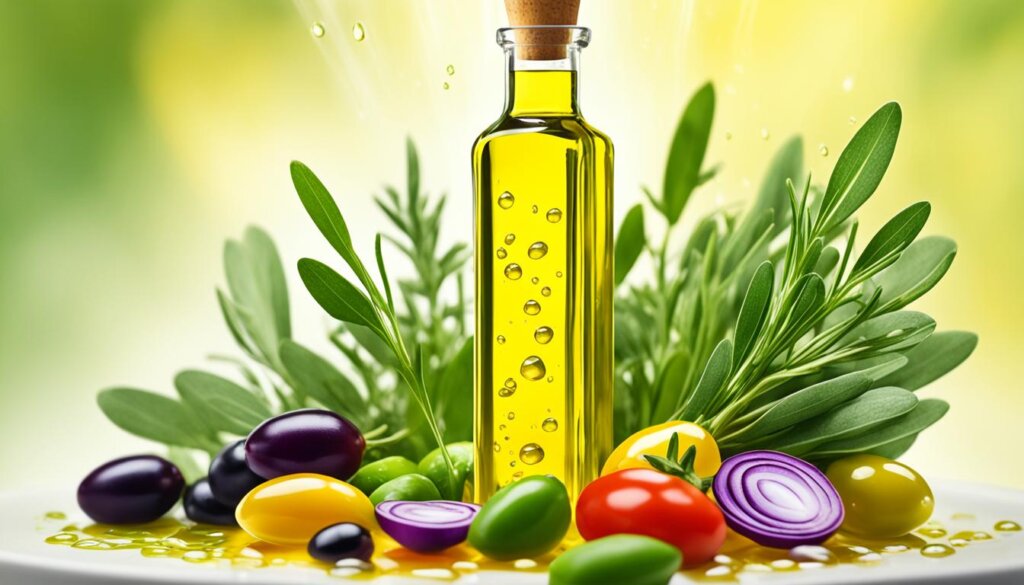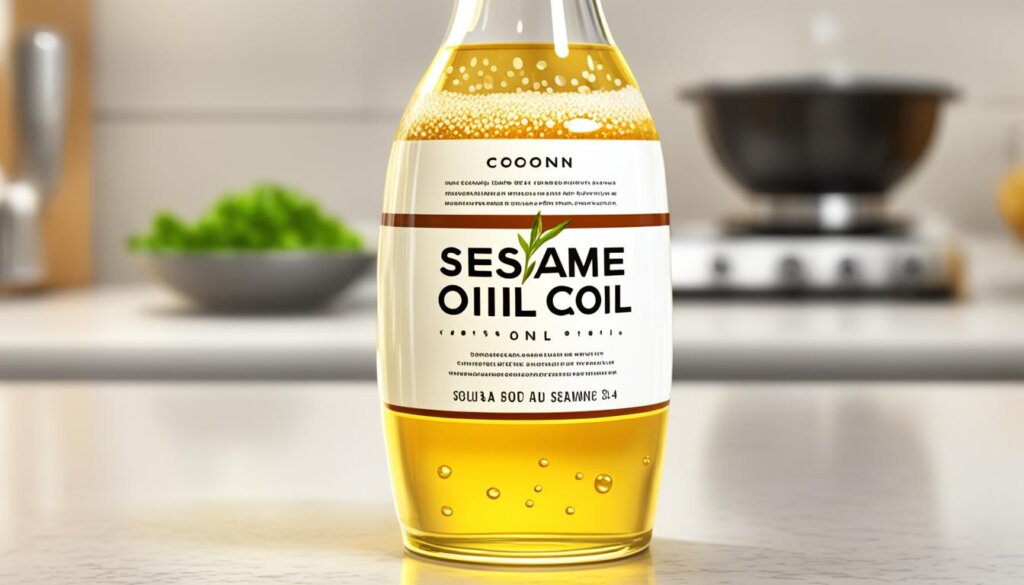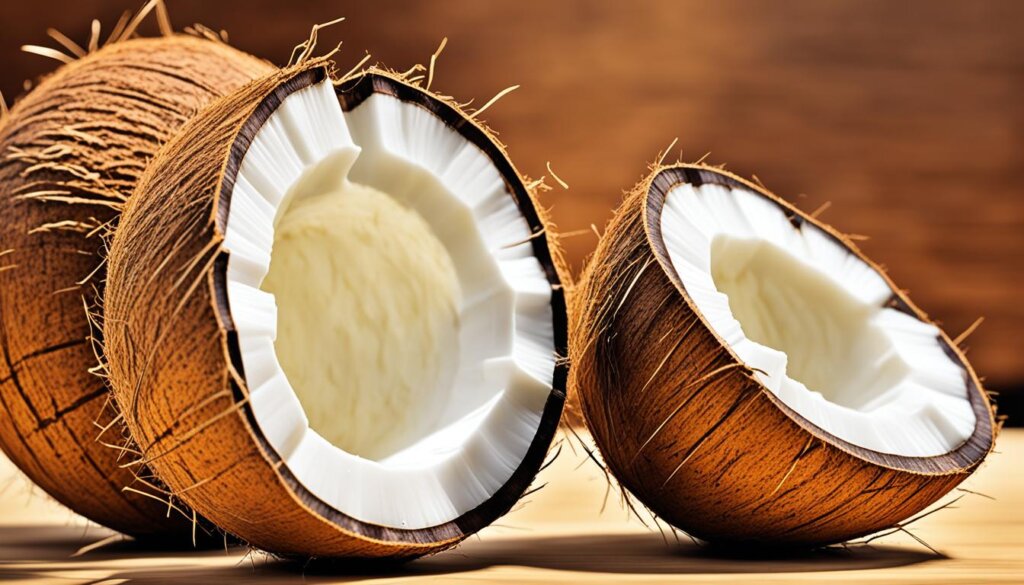FTC disclaimer: This post may contains affiliate links and we will be compensated if you click on a link and make a purchase.
Did you know that avocado oil can handle heat up to 520°F (271°C)? This is way more than olive oil’s 350°F (176°C). This means avocado oil is great for high-heat cooking like searing and stir-frying. Choosing the right cooking oil is key for your health and meal quality. This article will look at some of the top healthy options for your kitchen.
Cooking oils are a big part of our daily cooking. They affect the nutrition and health benefits of our food. However, not all oils are good for all cooking methods. The smoke point, fatty acid profile, and processing level of an oil matter a lot.
This guide will cover different cooking oils and their unique features. You’ll learn about their health benefits and best uses. From olive oil to avocado oil, find out the top choices to improve your cooking and health.
Key Takeaways
- Cooking oils vary in smoke points, fatty acid profiles, and processing levels, which affect their use in different cooking methods.
- Oils like avocado and safflower oil are great for high-heat cooking. They’re perfect for searing and stir-frying.
- Olive oil, sesame oil, and coconut oil are great for low-to-medium heat. They add unique flavors and health benefits to your meals.
- Picking the right cooking oil boosts your meal’s nutrition and flavor. It also lowers the risk of harmful compounds.
- Storing and handling cooking oils right keeps them fresh and safe to use longer.
Understanding Cooking Oils
Cooking oils are key in the kitchen. They add flavor and important nutrients. These liquids are made of fats like saturated, polyunsaturated (PUFA), and monounsaturated (MUFA) fats. The fatty acid composition of an oil affects its health benefits. Unsaturated fats like MUFAs and PUFAs are seen as better than saturated fats.
Types of Fats in Cooking Oils
Oils can be made through pressing or chemical refining. Refined oils like canola, corn, cottonseed, grapeseed, sunflower, soybean, sunflower, and vegetable oils work well in high heat. Unrefined oils may taste stronger but can’t handle as much heat. Trans fats, once common, are now seen as harmful and should be avoided.
Smoke Points and Oxidation
Every oil has a smoke point, the highest temperature it can handle before breaking down. Oils like Avocado and Refined Coconut are great for frying. However, oils like extra virgin olive and unrefined coconut are better for lower heat. It’s smart to keep a mix of oils in your kitchen.
Oil | Smoke Point |
|---|---|
Extra Virgin Olive Oil | 375ºF (191ºC) |
Light Olive Oil | 470ºF (243ºC) |
Refined Coconut Oil | 450ºF (232ºC) |
Unrefined Coconut Oil | 350ºF (177ºC) |
Canola Oil | 400ºF (204ºC) |
Refined Avocado Oil | 520ºF (271ºC) |
Unrefined Avocado Oil | 480ºF (249ºC) |
Refined Peanut Oil | 450ºF (232ºC) |
Unrefined Peanut Oil | 320ºF (160ºC) |
Sesame Oil | 350 to 400ºF (177 to 204ºC) |
Storing cooking oils right keeps them fresh and high-quality. Keep oils in a cool, dark place to prevent oxidation. Oils like walnuts and flaxseed should be stored in the fridge to last longer.
Olive Oil: The Mediterranean Staple
Olive oil is a key part of the Mediterranean diet. It’s known for its health benefits and many uses in cooking. This golden oil is full of monounsaturated fatty acids, especially oleic acid, which may fight inflammation and help prevent cancer.
Olive oil also has strong antioxidants like oleocanthal and oleuropein. These help lower blood pressure and protect against bad cholesterol. Eating olive oil often might help stop obesity, metabolic syndrome, and type 2 diabetes.
Health Benefits of Olive Oil
- Rich in monounsaturated fats, which may have anti-inflammatory properties
- It contains antioxidants that can help lower blood pressure and protect against LDL cholesterol oxidation
- It may help prevent obesity, metabolic syndrome, and type 2 diabetes
Best Uses for Olive Oil
Olive oil is great for many cooking tasks. Its medium smoke point of 350-410°F (175-210°C) is perfect for baking and sautéing. It is also peppery or grassy, making it ideal for dressings and drizzles. Extra-virgin olive oil is best because it keeps more antioxidants and nutrients.

“Olive oil is an essential component of the Mediterranean diet, which is consistently rated as one of the top diets for better health by U.S. News and World Report.”
Avocado Oil: Versatile and Nutrient-Rich
Avocado oil is a healthy cooking choice, full of monounsaturated fats like olive oil. It can handle high heat well and is perfect for deep frying, searing, and stir-frying. It also has compounds that might help fight inflammation and keep your heart healthy.
Studies show it can protect the liver, lower cholesterol, and blood pressure, and help the body absorb nutrients better. In one study, eating avocado oil lowered triglycerides and cholesterol levels more than butter did. It even helped lower blood pressure like a medicine in rats.
It’s full of lutein, which is good for your eyes and might prevent eye diseases. Adding it to salads can significantly boost the absorption of antioxidants.
Avocado oil can ease arthritis pain and stiffness. It’s also good for skin health, healing wounds, and easing psoriasis symptoms.
Adding avocado oil to your meals helps fight free radicals and lowers the risk of chronic diseases. It’s great for many recipes, like smoothies, salads, grilling, baking, and more.
Compared to olive oil, avocado oil has a bit more calories but a higher smoke point for high-heat cooking. Both oils are full of healthy fats, but avocado oil has more polyunsaturated fats.
Nutrient | Avocado Oil | Olive Oil |
|---|---|---|
Calories (per tablespoon) | 124 | 119 |
Vitamin E | None | 1.94 mg |
Vitamin K | None | 8.13 µg |
Potassium | None | 0.135 mg |
Calcium | None | 0.135 mg |
Iron | None | 0.076 mg |
Saturated Fat (per tablespoon) | 1.62 g | 1.86 g |
Monounsaturated Fat (per tablespoon) | 9.88 g | 9.85 g |
Polyunsaturated Fat (per tablespoon) | 1.89 g | 1.42 g |
Smoke Point | 520°F | 400°F |
“Avocado oil is versatile and suitable for various culinary uses, such as in smoothies, salads, grilling, baking, and as a replacement for other cooking oils.”
In conclusion, avocado oil is a great choice for a healthy diet. It’s full of nutrients and works well in many recipes. Its high smoke point and healthy fats make it perfect for different cooking methods.
Sesame Oil: Nutty Flavor, High Heat Tolerance
Sesame oil is a great cooking oil with a nutty taste. It can handle high heat up to 410°F (210°C), making it perfect for cooking methods like sautéing and stir-frying.
Types of Sesame Oil
There are two kinds of sesame oil: regular and toasted. Regular oil has a mild nutty taste, while toasted oil has a stronger nutty flavor, great for adding depth to dishes.
Health Benefits of Sesame Oil
Sesame oil is packed with antioxidants, such as sesamol and sesamin. These can help protect the brain and reduce inflammation. A study showed that it can also help manage blood sugar in people with type 2 diabetes.
Oil Type | Price Per Ounce |
|---|---|
Sesame Oil | $0.60 – $1.00 |
Avocado Oil | $0.45 – $0.80 |
Canola Oil | $0.30 – $0.40 |
Grapeseed Oil | $0.25 – $0.30 |

Sesame oil is great for cooking because of its heat tolerance and nutty taste. It also has health benefits. Whether you choose regular or toasted, it will improve your food.
Healthy Cooking Oil: Canola and Grapeseed Oils
It is important to choose a healthy cooking oil. Canola and grapeseed oils are great choices, and they offer unique benefits when cooking.
Canola Oil: Affordable and Versatile
Canola oil is easy to find and won’t break the bank. It’s low in bad fats and high in good fats like omega-3s. It can handle high heat, making it perfect for searing or frying. Its mild taste lets other flavors stand out in your dishes.
Grapeseed Oil: Light and Neutral
Grapeseed oil is another top choice, with a high smoke point of about 420°F. It tastes very light, so it won’t take over your recipes. It’s great for sautéing, roasting, and baking. Plus, it’s full of healthy fats, like omega-6 fatty acid linoleic acid.
Oil | Smoke Point | Nutrition | Best Uses |
|---|---|---|---|
Canola Oil | 435°F | Low in saturated fat, rich in monounsaturated and polyunsaturated fats, including omega-3s | High-heat cooking, searing, frying |
Grapeseed Oil | 420°F | High in polyunsaturated fats, especially omega-6 linoleic acid | Sautéing, roasting, baking |
Canola oil might be more processed, but it’s still a good choice in moderation. Grapeseed oil’s polyphenols could also have extra health benefits, but we need more studies. Both oils are great for your kitchen, offering versatility, high smoke points, and health benefits.

Coconut Oil: Saturated but Stable
Coconut oil stands out in the world of cooking oils. It’s mostly made of saturated fat, which some think is bad for health. However, coconut oil also has a high smoke point of about 450°F for the refined kind. This makes it great for cooking at high heat, like stir-frying or roasting.
It also has medium-chain triglycerides (MCTs) that might help with metabolism.
Health Benefits of Coconut Oil
People say coconut oil could help with skin, hair, and brain health. Studies show that saturated fats don’t cause inflammation, as some think. A large study found no direct link between saturated fats and heart disease.
Compared to other oils, coconut oil might help with weight loss. This is because it contains MCTs, which are easy to digest and can boost metabolism. It also contains lauric acid, which helps keep the gut healthy and fights infections.
In Thai and Indian cooking, coconut oil is often used for stir-fries and curries. When baking, you can swap vegetable oil with coconut oil, but remember that it stays solid at room temperature. Coconut oil can also replace butter in recipes and be used as a lotion for sensitive skin.
Even though it’s high in saturated fat, coconut oil has many benefits that make it interesting for health-conscious cooks. Just remember to use it in moderation, considering your diet and lifestyle.

“Coconut oil contains about 90% saturated fatty acids, with lauric acid making up around 40% of the total fat content.”
Coconut oil has about 7% caprylic acid and 5% capric acid. A study with 91 adults showed that coconut oil increased HDL cholesterol more than butter and olive oil. Another study found that it could raise HDL and lower the LDL-to-HDL ratio in women with belly fat.
Research suggests coconut oil might help reduce waist size in women with belly fat. A study with women found it made them feel less hungry than extra-virgin olive oil. People in Tokelau and Kitavan eat a lot of coconut but don’t get heart disease. Coconut oil is likely safe and could be good for health if eaten in moderation.
Flaxseed and Walnut Oils: Omega-3 Powerhouses
Flaxseed oil and walnut oil are great for getting omega-3 fatty acids from plants. They help fight inflammation and keep your heart healthy. One tablespoon of flaxseed has 2,350 mg of ALA omega-3s, which is a lot for your health. Walnuts give you 2,570 mg of ALA omega-3s in just an ounce, which is also very good for you.
These oils are full of omega-3s but can’t handle high heat well. Use them raw to keep their benefits and taste. Keep them in the fridge and use them quickly because they are delicate.
Plant-based omega-3s like ALA are key for health, but turning them into EPA and DHA is hard for your body. Eating algal oil or fatty fish might be better if you want more EPA and DHA.
Oil | ALA Content | Percent of Daily Recommended Intake |
|---|---|---|
Flaxseed Oil | 2,350 mg per 1 tbsp (10g) | 146-213% |
Walnut Oil | 2,570 mg per 1 oz (28g) | 160-233% |
Chia Seeds | 5,000 mg per 1 oz (28g) | 312-454% |
Brussels Sprouts | 44 mg per 1/2 cup (44g) | Up to 4% |
Algal Oil | 400-500 mg of DHA and EPA | 44-167% |
Hemp Seeds | 3,000 mg per 3 tbsp (30g) | 162-236% |
Perilla Oil | 9,000 mg per 1 tbsp (14g) | 563-818% |
Flaxseed oil and walnut oil are great for omega-3s but not for high heat cooking. Add them to your diet for health benefits and tasty meals.
Choosing the Right Oil for the Job
Choosing the right oil for cooking can greatly affect the taste and quality of your food. The smoke point is key. It’s the temperature when an oil starts to break down and release harmful compounds.
Culinary oils have smoke points from less than 250°F to more than 500°F. These points vary greatly because of the oil’s quality, heat source, and free fatty acid content.
High-Heat Cooking
For high-heat cooking, such as frying or searing, you need oils with a high smoke point. Avocado oil, grapeseed oil, refined olive oil, and refined peanut oil are good choices. They can handle up to 500°F without breaking down.
These oils are less likely to oxidize. This helps keep the food’s quality and taste.
Low-Heat Cooking and Dressings
Choose oils with lower smoke points for low-to-medium heat cooking or cold uses like dressings. Extra-virgin olive oil, sesame oil, walnut oil, and flaxseed oil are great. They keep their natural antioxidants and flavors when not heated high.
Picking the right oil is key for a heart-healthy diet. Oils full of poly and mono-unsaturated fats can lower bad cholesterol in the blood. However, oils high in saturated fats can raise bad cholesterol and heart disease risk.
Knowing about smoke points and nutritional facts helps you choose better oils. This way, your meals can be tasty and healthy. The right oil can really change your cooking.
Storing and Handling Cooking Oils
Storing and handling cooking oils right is key to keeping them fresh and tasty. Here are some tips to help you:
- Keep oils in a cool, dark spot, away from heat, light, and moisture.
- Use the oil for the best taste and freshness within a few months after opening.
- Refrigerating oils like flaxseed and walnut can make them last longer.
- Avocado oil stays fresh for 6 to 8 months in the pantry, maybe longer in the fridge.
- Use extra virgin olive oil for the best taste within three to six months.
- Nut oils are best used for flavor in three to six months but can last a year if kept cold and sealed.
- Unrefined coconut oil can last two to three years if stored right, while refined coconut oil lasts 12 to 18 months.
- Vegetable and canola oils can last 12 to 18 months if stored correctly.
Don’t reuse cooking oils at high heat, as they can create harmful compounds. It’s best to use fresh oil for each cooking session. If you have rancid oil, check with your local waste management for disposal options. You can also mix it with absorbent materials like cat litter or sawdust before throwing it away.
By following these easy tips, you can keep your cooking oils fresh, tasty, and safe for your kitchen.
Conclusion
Choosing the right healthy cooking oil options is key to a balanced diet and tasty cooking. Knowing the benefits of different oils allows you to pick the best for your cooking and diet. Whether you’re sautéing veggies, baking, or drizzling on food, using quality oils makes meals tasty and healthy.
This article gives tips for choosing the right oils, from olive oil for heart health to avocado oil for versatility and sesame oil for a nutty taste. Knowing about smoke points, fatty acids, and health benefits lets you fill your pantry with the best oils for your cooking and health.
The secret to a healthy kitchen is picking the right oils for each dish. With this knowledge, you can make meals that are both tasty and healthy, which will support your health and happiness in the long run.
FAQ
What are the healthiest cooking oils?
Healthy cooking oils include olive oil, avocado oil, sesame oil, canola oil, and grapeseed oil. These oils are full of heart-healthy fats. They also have high smoke points, making them great for different cooking methods.
What is the difference between saturated, monounsaturated, and polyunsaturated fats in cooking oils?
Saturated fats might raise bad cholesterol levels. But unsaturated fats, such as monounsaturated and polyunsaturated fats, can help your heart. The fatty acid mix in an oil affects its health benefits.
What is the smoke point of a cooking oil, and why is it important?
The smoke point is when an oil starts to break down and release harmful substances. Oils with a high smoke point are good for high-heat cooking, while those with lower smoke points are better for low heat.
What are the health benefits of olive oil?
Olive oil is full of monounsaturated fats, like oleic acid. This may help fight inflammation and cancer. It also has antioxidants that can lower blood pressure and protect against bad cholesterol.
What makes avocado oil a good cooking oil option?
Avocado oil has a smoke point of about 520°F, perfect for high-heat cooking. It’s also packed with monounsaturated fats and compounds that may fight inflammation and improve heart health.
What are the different types of sesame oil, and how are they used?
There are two sesame oils: regular and toasted. Regular has a mild taste, while toasted has a strong nutty flavor. Toasted is better for flavoring dishes, not high heat.
What are the potential health benefits of sesame oil?
Sesame oil contains antioxidants like sesamol and sesamin. These may protect the brain and reduce inflammation. A study showed that it helped manage blood sugar in people with type 2 diabetes.
How do coconut oil, flaxseed oil, and walnut oil differ from other cooking oils?
Coconut oil is mostly saturated fat, great for high heat. Flaxseed and walnut oils are rich in omega-3 fatty acid ALA but not good for high heat.
When should I use high-heat cooking oils versus low-heat oils?
Use oils with a high smoke point for high-heat cooking, like avocado, grapeseed, and refined olive oil. For low-heat or cold uses, choose oils like extra-virgin olive oil, sesame oil, walnut oil, and flaxseed oil.
How should I store and handle cooking oils to maintain their quality?
Keep cooking oils in a cool, dark place away from heat and moisture. Use them within a few months after opening. Refrigerate delicate oils like flaxseed and walnut to keep them fresh.








